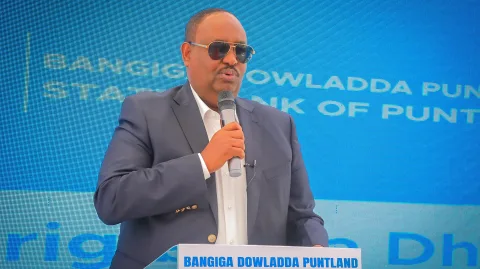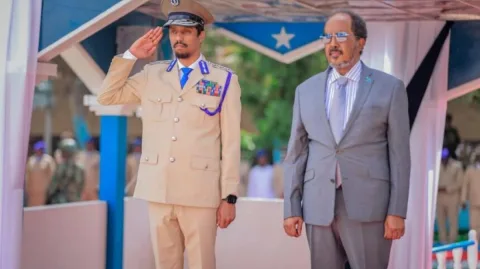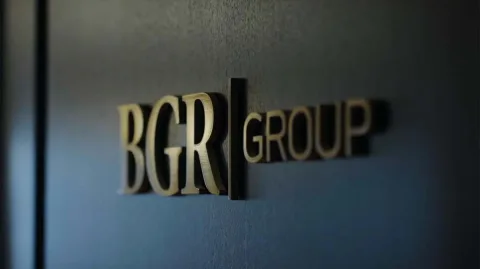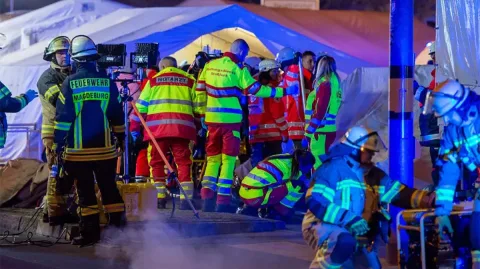A confidential U.N. monitors’ report warns of “systematic abuses” by Somalia’s government, which the monitors say…
 A confidential U.N. monitors’ report warns of “systematic abuses” by Somalia’s government, which the monitors say has allowed the diversion of weapons that Somali authorities purchased after the U.N. Security Council eased an arms embargo on Mogadishu last year.
A confidential U.N. monitors’ report warns of “systematic abuses” by Somalia’s government, which the monitors say has allowed the diversion of weapons that Somali authorities purchased after the U.N. Security Council eased an arms embargo on Mogadishu last year.
Some of the arms believed to have been diverted were earmarked for a leader of the al Qaeda-linked Islamist militant group al Shabaab, the monitors said in their report, which was obtained by Reuters.
In its 14-page report to the Security Council’s sanctions committee, the U.N. Somalia and Eritrea Monitoring Group recommends either restoring the full arms embargo or at least tightening notification and reporting requirements related to arms deliveries.
“The Monitoring Group has identified a number of issues and concerns over current management of weapons and ammunition stockpiles by the Federal Government of Somalia (FGS), which point to high-level and systematic abuses in weapons and ammunition management and distribution,” the report said.
The panel of independent experts tracks compliance with the U.N. Somalia-Eritrea sanctions regime.
The 15-nation council’s decision to ease Somalia’s decades-old arms embargo last March was a controversial one, although Washington supported the Somali government’s appeals for restrictions to be relaxed to enable it to better arm its security forces to fight al Shabaab.
The new report details difficulties the monitors have had in getting access to weapons stockpiles in Somalia and information about its growing arsenal. It says the government cancelled several inspections of armories that the monitors and U.N. officials had planned to undertake.
DISCREPANCIES
The monitors describe how parts of shipments of weapons from Uganda and Djibouti, including assault rifles, rocket launchers, grenades and ammunition, “could not be accounted for”. The report also mentioned discrepancies in accounts of what had happened to arms sent from Ethiopia.
“Given the gaps in information … it is impossible to quantify what the scale of diversion of weapons stocks has been,” the report said. “However, the Monitoring Group has obtained other pieces of qualitative evidence that point towards systematic abuses by the (Somali army).”
The Security Council imposed the embargo on Somalia in 1992 to cut the flow of weapons to feuding warlords, who a year earlier had ousted dictator Mohamed Siad Barre and plunged the country into civil war.
Somalia was virtually lawless until 2012, when it held its first vote in 21 years to elect a president and prime minister.
The monitors said they had identified at least two clan-based “centers of gravity” for arms procurement within Somali government structures that were distributing arms to “parallel security forces and clan militias that are not part of the Somali security forces”.
One of those groups is within the Abgaal sub-clan of Somali President Hassan Sheikh Mohamud, who last month said he wanted the U.N. Security Council to extend the partial lifting of the embargo when it expires in March because government troops needed more and better equipment to battle al Shabaab.
“A key adviser to the president, from his Abgaal sub-clan, has been involved in planning weapons deliveries to al Shabaab leader Sheikh Yusuf Isse … who is also Abgaal,” the report said.
Mohamud told Reuters in January his government had met all conditions related to the partial lifting of the embargo. “We have been following the instructions of the Security Council and the committee that has been assigned … to monitor,” he said.
GOVERNMENT MINISTER
The report also referred to the role played by a Somali government minister from the Habar Gedir sub-clan in relation to arms purchases from a “foreign government in the Gulf” – a government the report does not identify.
“The Monitoring Group has received credible evidence of un-notified weapons deliveries by air from the Gulf state to Mogadishu during the course of October 2013, which would constitute a direct violation of the arms embargo,” it said.
“Indeed, after delivery, some of the weapons were moved to a private location in Mogadishu,” the monitors said.
The easing of the U.N. arms embargo has allowed sales of such weapons as automatic assault rifles and rocket-propelled grenades, but left in place a ban on surface-to-air missiles, large-caliber guns, howitzers, cannons and mortars as well as anti-tank guided weapons, mines and night-vision weapon sights.
“The trends described above demonstrate that the implementation of the (government’s) security policy is being captured by clan and sub-clan politics,” the report said.
“Weapons distribution along clan lines for the prosecution of clan warfare is ultimately reducing the prospect of a cohesive strategy by the (government) against al Shabaab.”
The report said private arms markets had popped up in Mogadishu, where weapons diverted from the army had been sold.
The monitoring group presented eight options for the arms embargo when the current easing expires next month. They range from lifting the embargo altogether to restoring the full embargo and possibly adding new measures.
It recommended either restoring the full embargo or at least keeping it as is and introducing stricter rules on notification and reporting to the U.N. sanctions committee.
It also suggested the possibility of beefing up the U.N. mission in Somalia by attaching a verification team to track arms deliveries and stockpiles in Somalia.
Source: Reuters





